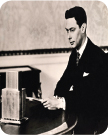Practice Your Delivery
In any speech, your objective should be to communicate a message to an audience. If your message is clear, the audience will connect with it; if it’s buried in a sea of mumbling or if it’s forced to compete with distracting body movements, the audience will miss your point. As you practice, you can improve the aspects of delivery you studied in this chapter and concentrate on your message.
- Focus on your message. Concentrate on the way that you express an argument, paraphrase a quotation, or explain a statistic. If you focus on your message, the right delivery will usually follow naturally.
- Use mirrors cautiously. Conventional wisdom has advocated rehearsing in front of a mirror in order to practice eye contact, maximize facial expressions, and assess gestures and movement. But you won’t have mirrors when you deliver the speech; they can also make you feel self-
conscious, distracting you from your message. - Record a practice session. Recording your performance will allow you to get a sense of how well you project your voice, articulate your points, and use nonverbal cues.
- Ask for feedback. See if you can find a person or two to listen to your speech who will give you an honest and constructive critique of your performance. Ask what they remember most about your presentation. Did they focus mostly on your content, or were they distracted by your postures, gestures, or stammering? Were your presentation aids helpful, or were they distracting or confusing?
AND YOU?
Question
weHTsu6hK6NU3kqPfIA8PdvHpDS7NEjansitqxO78Co9xS9OFVY9ktjGYuvILIhJqegSjh6rzepQwRiYf5vqI1LeNJv8Vyk0R7cq4ZE+FX8KasmxSqLZk71+L77jFK3FmQoUwESewWfTKiZ0KXFPcAUDaX7cPJn4cTrC8WL0CO47ereFucSs5cWbwPdBieaA32AGfI5+Dtoyk9iUiwEieLAJ/hTg9t3qneWBpZszTodZQroEOcT8xuhMIp85zO1288zSsM5OibSVuujO1IMpdDZINOqxX5CR6+DCRA70oNUehCwOSBeIDOHIqU4Be77xGt+yceuqdIkg28iZloUSRTIQ+wrm+fWhpEYA+/hwTB9qh1fVGhHcLTBl94Q2LvSUYWjZpOqWwDMcrv/7sOJ/aNrurke6n9LZPz5lyMu2y72XvwY3zJjf5KgrRm2qMRGYe1u5+h5xS9ildiVpFiE4KdG76m5SPczYj80F/tKMI1jYigrdINZ3Yn8mPuTadZs9fESeOXUulSslbWRFCOzAjN74p4FcSNPeBACK TO
The King’s Speech
 At the beginning of the chapter, we talked about Britain’s King George VI, or Albert, who was thrust into a position that demanded public speaking skills even though he struggled with a challenging stutter. Let’s think about Albert’s journey, as well as that of David Seidler, who was inspired by Albert’s story and eventually brought it to the screen with The King’s Speech, in light of what we’ve learned in this chapter.
At the beginning of the chapter, we talked about Britain’s King George VI, or Albert, who was thrust into a position that demanded public speaking skills even though he struggled with a challenging stutter. Let’s think about Albert’s journey, as well as that of David Seidler, who was inspired by Albert’s story and eventually brought it to the screen with The King’s Speech, in light of what we’ve learned in this chapter.
- Albert struggled with his stammer for years and was only able to get it under control after prolonged, and somewhat experimental, speech therapy. Fortunately, by the time he was unexpectedly crowned king, he had made great progress. Had his position as a royal prince not required him to speak publicly, he might have avoided speech therapy. He was prepared to speak, even though he did not wish to do so, and never expected to have to do so—
at least not as king. - As a king in the early twentieth century, Albert had to contend with emerging media—
particularly radio— when giving speeches. Although he still had to contend with the transactional nature of public speeches (in which he must interact with and adjust to the audience), radio gave him the opportunity to gain confidence and practice: the audience’s feedback is limited in radio’s linear model of communication. - The audience plays a role in the success of any speech, and it is likely that British citizens, facing the uncertainty of world war, wanted the king to succeed. As actor Colin Firth (who portrayed the king in David Seidler’s The King’s Speech) noted, “People knew this man was facing his demons just by speaking to them. I think there was a sense that it cost him something. They found it valiant” (CBS News, 2010).